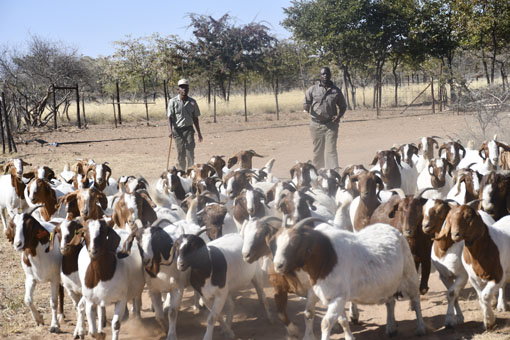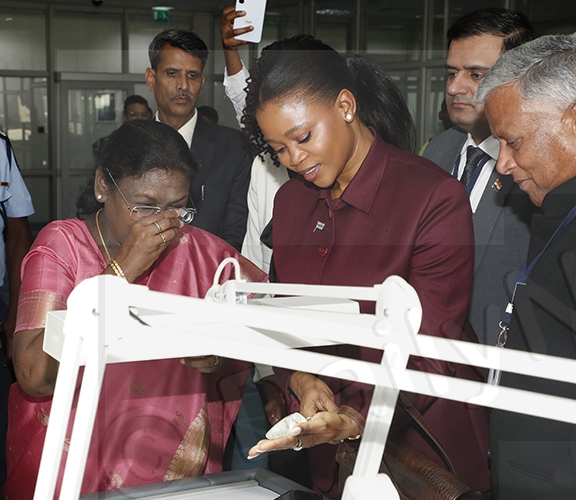Modori into strives with Boer goat
12 Jul 2021
Ever heard of the saying that business and pleasure do not mix?
Think again and maybe consider American politician Aaron Burr’s quote, of the rule of my life is to make business a pleasure and pleasure my business, a notion resounded by Mr Keitumetse Modori’s story.
What started as a mere visit to Zimbabwe motivated by his adventurous side for bushlife gave birth to Bob Modori Stud Boer Goats. Mr Modori, a miner at Orapa, Letlhakane and Damtshaa Mines, never thought his fantasy could lead him to where he is today.
Given his love for outdoors, some years back he visited Zimbabwe, and it was while on that visit that his love for bushlife deepened, stemming from the affordability of the lifestyle, such as cheap water among others.
The no water bill kind of lifestyle made him to think of other avenues in which this could be applicable. Being raised by a small scale farmer who reared cattle, Mr Modori developed the love for animals from a tender age.
He reared Tswana breed as a squatter from 2004 to 2011, despite a breakthrough in 2009, as he was allocated a farm north of Letlhakane, a few kilometres from Francistown road.
However due to various challenges, he spent three years without developing it, hence he stayed a while in the bush.
In 2012 he took the first step of the ladder by installing the borehole and fencing the farm.
In an effort to upgrade his production and supply of goat meat, he applied for a loan at Citizen Entrepreneurial Development Agency in 2013 and was not successful.
Undeterred by being turned down by the financial agency, he made it a point to partake in the Voorslag Field Day in 2014, and he was the only one who exhibited small stock.
Through the exhibition, he realised how taxing it was to prepare for a field day, hence he made no sale, and by then a goat was sold at a minimum fee of P800.
Determined to make it in small stock production, he embarked on a benchmarking exercise in South Africa. Mr Modori’s passion landed him at Petersburg, South Africa, a place he had never been to.
Through social media he learnt about Bosveld auction, usually held in Petersburg and regarded as a platform to exchange notes with sautéed small stock producers and managers. As luck would have it, on his way to the auction, he met some of the local farmers at the border who were also on the same trip.
Bosveld auction was indeed the right remedy for him, as he learnt that Boer goat production was more profitable. A Boer goat buck then was about P16 000 and female goat was P12 180.
He visited the exhibitors at their farms in Petersburg and also visited Mr Anthony Bothman at a settlement called Vivo located in the peripheries of Petersburg.
The miner learnt a couple of pluses in the industry such as frequent dipping of goats and having dip tanks. The farmer tapped a lot on small stock management ranging from processing of feeds and keeping of animals in paddocks, which motivated him.
He realised that Mr Bothman’s challenges were similar to those in Boteti as they both had hard water. The South African farmer kept Boer goats and Kalahari Red, but was more into Boer goats.
Mr Modori did various benchmarking exercises in areas such as Upington, Kuruman and Kimberly in South Africa and locally at the Agricultrural Show in Gaborone.
In Kimberly he met the World Best Boer goat breeder by the name Lukas Burger, and he saw a significant difference in his breed of stock. It was totally different from the goats he saw in all the farms he travelled to. He took the decision to buy 12 weaners and a young buck through self-financing.
A weaner at that time was approximately P3 000 and a buck was about P5400. Each goat was charged about P800 for quarantining and he spent almost P10 000 in total for quarantining the 13 goats. Although some were skeptical about the goats surviving, he persevered, through the assistance of veterinary officers vaccinated his goats.
To ensure the security of the goats, he tested their temperatures daily and vaccinated them with Teremysin as advised by veterinary officials. In 2017, Mr Burger invited him for an auction at Parys in Free State, which he attended for benchmarking purposes, especially on pricing as well as Boer goat management.
Mr Burger negotiated for Mr Modori to be given goats on credit. He, therefore, bought another thirteen goats and came back to sell all his cattle to venture into small stock production.
Mr Modori continued treating his goats the same way they were treated at Vivo, dipping them and they survived and adapted to the new environment.
He started reaping the benefits of his investment in 2018, as he sold two of his first bucks at a tune of P26 000 to pay for his son’s school fees. Later on he applied for a personal loan to expand his stock and managed to secure 10 more Boer goats.
After that he started experiencing challenges as the goats began to die, and decided to commute from the farm to his workplace at Damtshaa Mine, 18 kilometres away.
The arrangement proved to be difficult for him as he had to stay in a shack, use firewood to warm bathing water, and the absence of television worsened it. Contrary to the impression he initially had about bush life, life became taxing due to distance between his workplace and the farm, as he had to fuel his vehicle and the borehole engine.
Things started taking a bumpy route, as all his vehicles and borehole engine broke down, compelling him to move back to the village to board the mine bus to work.
He had to work round the clock to ensure that he fixed everything and returned to the farm.
He attended Serowe Agricultural Show in 2018 and scooped all the small stock categories medalds, selling one buck at P9 000.
Mr Modori went on to prove that he meant business by attending the national agricultural show in the same year where his bucks won position two while the junior bucks won position two and three. He sold three bucks at the event.
Due to his love for small stock, in 2019 he introduced competition for small stock at Voorslag Field Day and won all the categories and a cherry on top was when President Dr Mokgweetsi Masisi bought his buck for P35 000.
Dr Masisi’s patronage generated a lot of interest among buyers in Gaborone and Bobonong mostly. The interest motivated him to start advertising and marketing his stock on social media.
Reviewing his farm he realised that the bucks he produced in 2017 had never been produced in his farm before.
He became cognizant of the fact that the bucks that were bought in 2017 were pregnated by a buck named Slingshot from Lukas Burger.
The young bucks then were quite unique in terms of quality and that motivated him to buy a stronger buck for P130 000.
Last year because of demand from farmers, he decided to increase his stock through funding from CEDA.
He noted that it was not an easy road, buying outside the country. The farmer bought average goats, two top show use goats and a buck worth P250 000.
Apart from supplying local and international market with his goats, Modori’s dream is to compete and represent Botswana at the world show billed for South Africa in 2027.
Presently he is working on launching his first annual production sale, where he will be selling a number of goats as Bob Modori Stud Boer Goats. His intends to embark on field days where he would educate Batswana interested in small stock production.
Through goat sales he has acquired three cars and sees himself building his dream farm house in the near future. Mr Modori recently sold an ewe and three kids at P54 000 during the auction held in Letlhakane.
Through proceeds from goats sale, he bought 15 Bonsmara cows and upgraded the farm to be solar system-operated and is no longer using fuel to operate the borehole. He has two employees. ENDS
Source : BOPA
Author : Thandy Tebogo
Location : letlhakane
Event : Feature
Date : 12 Jul 2021






